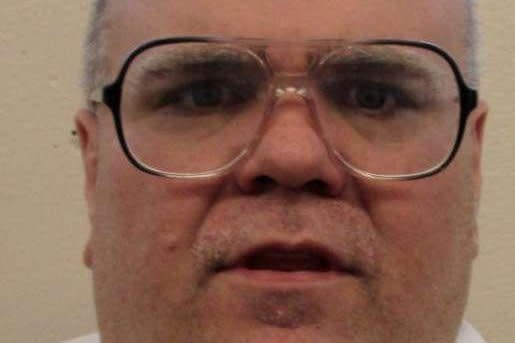Alabama plans another execution with nitrogen hypoxia

Feb. 22 (UPI) -- Alabama has asked the state's Supreme Court to approve a date for a second execution using nitrogen hypoxia, which was used for the first time in January.
The state filed its date request Wednesday to use the gas to execute Alan Eugene Miller, CBS News reported.
The court ruled earlier that Miller's execution for the 1999 workplace shooting of three co-workers could only be done via nitrogen hypoxia after an attempt to kill him by lethal injection in 2022 failed. Corrections staff couldn't place an IV needle into one of his veins.
Alabama became the first in the world to use nitrogen hypoxia in an execution with the Jan. 25 death of Kevin Eugene Smith.
Smith, 58, had been sentenced to death following his 1996 conviction for accepting $1,000 from a pastor to murder the pastor's wife, 45-year-old Elizabeth Sennet, in March 1988.
Miller, 59, was convicted of murdering co-workers Lee Holdbrooks, Terry Jarvis and Scott Yancy during a shooting in a Birmingham suburb. Miller was a truck driver at Ferguson Enterprises in Pelham, Ala., where he killed Yancy and Holdbrooks. He then drove to Post Airgas, where he'd been laid off months earlier, and killed Jarvis.
Execution via nitrogen hypoxia requires the use of a gas mask fitted over the prisoner's mouth and nose followed by the application of pure nitrogen gas to asphyxiate the prisoner. The protocol created by Alabama says the patient should pass out within a few seconds and die painlessly due to a lack of oxygen within 15 minutes.
Smith's execution, though, didn't fully follow that script. Instead, witnesses say he stayed awake for several minutes after his executioners administered the nitrogen gas, "shook and writhed" for about two minutes and breathed heavily for several more minutes, according to the Death Penalty Information Center in Washington.
He was pronounced dead 32 minutes after the nitrogen gas first was administered.
On the night of Smith's execution, Alabama Attorney General Steven Marshall issued a news release that said "Alabama's new method is humane and effective" and "easy to carry out."
"Alabama has made the judgment that some crimes are so horrific that they warrant the ultimate death penalty," Marshall said. "But anti-death-penalty activists have worked to nullify that moral judgment through pressure campaigns against anyone assisting states in the process."
The DPIC's leader said the use of nitrogen hypoxia amounts to torture.
"The willful ignorance and self-delusion of Alabama officials to the torture Mr. Smith experienced when they used nitrogen gas to execute him does not change the reality of his pain and suffering, nor will it change the pain and suffering others will experience if this method is used again," DPIC Executive Director Robin M. Maher said in an email to UPI.
Officials for Human Rights Watch also opposed the execution via nitrogen hypoxia, saying it "is not based on any scientific evidence" and instead is based on "speculation from accidental deaths by nitrogen."
Veterinarians won't use nitrogen hypoxia to euthanize most animals due to "ethical concerns," the group said.
Alabama, Mississippi and Oklahoma are the only states to approve nitrogen hypoxia as a method of execution.
Officials with the Alabama attorney general's office could not be reached for comment.
